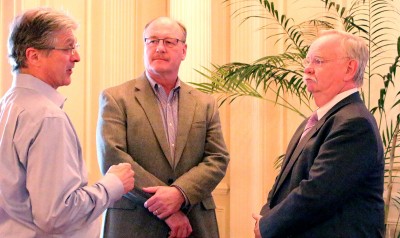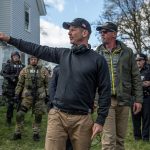
The Boston University Board of Trustees’ Advisory Committee on Socially Responsible Investing hosted the first of several forums Thursday to explore the issues surrounding climate change and divestment from fossil fuels.
The forum, titled “The Economic and Societal Impact of Climate Change,” brought about 50 students and faculty members to the Metcalf Trustee Center.
BU President Robert Brown said the forums are intended to present the community with “insights” from recognized experts about climate change and fossil fuels.
“As part of these deliberations, the committee proposed, and I strongly support it, the idea of holding a series of BU community forums in which recognized experts would give us their insights relating to climate change in the role of fossil fuels,” he said at the forum.
Speaker John Reilly, co-director of the Massachusetts Institute of Technology Joint Program on the Science and Policy of Global Change, spoke regarding climate change around the world and theorized possible solutions for the widespread problem.
“The impacts of climate change spread across so many different things, a different problem in every case,” he said at the forum. “The climate issue is, of course, an important one, but it’s wrapped together with many other issues wrapped together with air pollution in general, food, water, energy issues … so we don’t think you can look at one of these problems in isolation. You need to look at them together.”
Reilly said many people believe a shift away from fossil fuels and to electricity can help solve the problem of climate change.
“This need for more electricity, for people to have access to energy, is a challenge because that may mean more fossil fuels,” he said. “Unfortunately, there’s enormous amounts of the stuff and the technologies to get it out are getting better. What does that mean for the planet? It leads to significant environmental change.”
The effects of prolonged fossil fuel use are now more evident, Reilly said.
“We used to be able to pollute some area and move someplace else, and it didn’t really affect us,” he said. “Now we are affecting ourselves. We can’t really escape it.”
Reilly said coordinating policies and deciding what issues take precedence are some of the main challenges to addressing climate change.
“If we tax the wrong things too much, then we can worsen the problem as well,” he said. “It really does require a careful evaluation of what’s going on.”
Reilly also said there have been multiple efforts to convince people that climate change is happening and is a real concern.
Dean of Students Kenneth Elmore attended the forum and said it is important for people to get involved in the public conversation on climate change.
“We need to get information, and information is an important consideration when we start thinking about whether to invest [or] divest in fossil fuels,” he said. “For me, personally, this is great because … my wiring is to think about the social and economic impacts of climate change, and this was great to help me focus in a little bit.”
Besides environmental, economic and social impacts, there should be some moral consideration when talking about the issue of divestment, Elmore said.
“Anytime you’re talking about divestment, there is a moral conversation that needs to be had,” he said. “Anytime we talk about asking human beings to change their behavior, we’ve got to give people a reason why, and that comes down to this deep question about what’s our moral behavior and what do we think is right.”
Several attendees said it is important to have a forum about divestment and educate the BU community.
Ryan Shannon, 22, a graduate of the New England Conservatory of Music, said he hopes those making the decision about divestment from fossil fuels found the information presented at the forum to be impactful.
“There’s nothing that gets the point across more than a bunch of facts and figures and graphs for the big heads to scratch their head and go, ‘Yeah this is a good idea or it’s not,” he said.
Gabrielle Fischler, a fifth-year student in the College of Arts and Sciences and the College of Fine Arts, said she appreciates being included in conversation about divestment.
“It [the forum] is getting the conversation going,” she said. “I’ve been here for five years, and this is one of the first lectures that I’ve ever seen that’s open to the Boston University community on this topic. The conversation is already happening more than it has been in the past few years.”
[mediagrid cat=”19878”]
Correction: An earlier version of this article did not correctly identify the titles of Anthony Janetos and John Reilly in the caption. This article has been edited to reflect this change.














